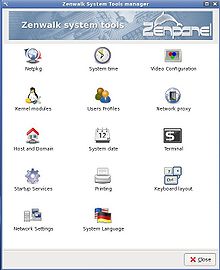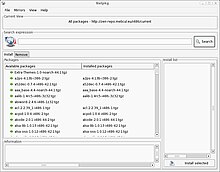Zenwalk
 | |
 Zenwalk Linux 5.2 | |
| Developer | Jean-Philippe Guillemin |
|---|---|
| OS family | Linux |
| Working state | Current |
| Source model | Open Source |
| Latest release | 6.0 / March 7, 2009 |
| Kernel type | Monolithic kernel |
| License | Various |
| Official website | www.zenwalk.org |
Zenwalk (formerly Minislack), or Zenwalk Linux, is an operating system founded by Jean-Philippe Guillemin. It was originally based on Slackware. Since its creation, the distribution has become very different from Slackware in most regards while still maintaining compatibility with its binary packages. Zenwalk aims to be a multi-purpose Linux distribution by focusing on Internet applications, multimedia and programming tools.[1] Additionally, Zenwalk comes with many specialized tools, designed for beginner through advanced users as it offers system configuration via both graphical and command-line operations.
History
Jean-Philippe Guillemin, also known as "Hyperion" or "JP" is the creator and main contributor to Zenwalk Linux. He earned a degree in Electrical Engineering at the University of Nantes, and is now working for Telindus, a group of companies offering ICT Solutions and Services, as Project Manager and Security Engineer. Jean-Philippe also developed several projects like Snorter, a reporting frontend for the Snort Intrusion detection system, and some system administration tools for the Linux operating system (Netpkg software package manager, Xnetconf network configuration tool among others).
Zenwalk was originally called Minislack up to version 1.1, taking its current name with version 1.2 released 2005-08-12. Originally using KDE as its desktop environment, Zenwalk now uses Xfce as of version 0.3, although GNOME and KDE packages have always been available separately.
Aims
The Zenwalk Project aims to create a lightweight Linux distribution (through using only one application per task on the release ISO image), optimization for a specific processor architecture to increase execution speed, and introduces a comprehensive package management system with dependency resolution.[2]
Community
The Zenwalk Project has a forum that allows users and developers alike to post their issues, concerns and praise.
The newest official software packages are published in the -snapshot tree. When sufficient testing and debugging have been completed, a package is moved to the -current tree, where most users can download software to update their systems.

The community is also encouraged to take part in software package development, since the official software pool is considered limiting by some users. This allows third-party software to be made compatible with the Zenwalk directory structure, as well as improved interoperability with the rest of the distribution.
Package management

Zenwalk uses the netpkg package management tool. It is developed in-house, and it provides the main functionalities of the apt-get variety of package managers. It uses Slackware's .tgz package format, but adds dependency resolution capabilities. The system uses meta files to provide dependency information, as well as package description during the install process. This convenience is only available to the official Zenwalk mirrors listed in the netpkg configuration file, netpkg.conf. In addition to the original netpkg command line interface, xnetpkg provides a GUI frontend with similar capabilities.
Additionally, Zenwalk is compatible with Slackware package management tools such as slapt-get and its frontends, and have similar functionality as that of netpkg.
As of Zenwalk 4.6, package compatibility with Slackware is still maintained. Slackware packages may be used to substitute Zenwalk packages where necessary. Additional package availability can be found at LinuxPackages.net.
| version | date |
|---|---|
| Minislack 0.1 | May 21 2004 |
| Minislack 0.2 | August 8 2004 |
| Minislack 0.3 | February 17 2005 |
| Minislack 0.4 | March 26 2005 |
| Minislack 1.0 | April 24 2005 |
| Minislack 1.0.1 | May 3 2005 |
| Minislack 1.1 | June 10 2005 |
| Zenwalk 1.2 | August 12 2005 |
| Zenwalk 1.3 | October 15 2005 |
| Zenwalk 2.0 Core | November 27 2005 |
| Zenwalk 2.0.1 | December 4 2005 |
| Zenwalk 2.1 (Core) | January 18 2006 |
| Zenwalk 2.2[4] | February 16 2006 |
| Zenwalk 2.4[5] | April 4 2006 |
| Zenwalk 2.6[6] | May 23 2006 |
| Zenwalk 2.8[7] | July 21 2006 |
| Zenwalk 3.0[8] | September 8 2006 |
| Zenwalk 4.0[9] | November 20 2006 |
| Zenwalk 4.2[10] | January 6 2007 |
| Zenwalk 4.4[11] | February 22 2007 |
| Zenwalk 4.4.1[12] | February 24 2007 |
| Zenwalk 4.6[13] | June 1 2007 |
| Zenwalk 4.6.1[14] | June 6 2007 |
| Zenwalk 4.8[15] | October 6 2007 |
| Zenwalk 5.0[16] | January 18 2008 |
| Zenwalk 5.2[17] | June 7 2008 |
Supported architectures
Zenwalk Linux is built and optimized primarily for the i686 architecture, although it supports i486 computers as well.
Project versions
There are four main versions of Zenwalk as of Zenwalk 5.2:[18]
Zenwalk (full version ~ 505 MB iso download) is a distribution aimed at mainstream desktop and development use. Designed to be a stand-alone operating system, it installs to the hard drive by way of a ncurses-based installer. Install times range from 15-30 minutes.[citation needed] It includes all of the officially released software packages that are deemed most useful by the Zenwalk community. The default install also includes development packages like gcc, and some proprietary media packages (such as Adobe Flash Player) and drivers in order to provide a full featured default install. The default desktop environment is Xfce.
Zenwalk Core (~ 230 MB iso download) is a Zenwalk system built with customization in mind. Released with no X Window System binaries, its aim is to allow a skilled user to build a system fit for his or her needs. The project's lead developer is Emmanuel Bailleul.
ZenLive (~ 476 MB iso download) is a Zenwalk system built on a Live CD design. ZenLive follows the progress made by the full Zenwalk system closely, thus mirroring the version number, and attempts to stay true to the original distribution's goals. In addition, it includes all of the necessary libraries and applications to develop and compile software, a particularly rare feature in Live CD distributions. Project members include Pierrick Le Brun, creator, Mauricio Tricoli, project lead, and Michael Verret, artwork.
Zenserver (~ 263 MB iso download) is a Zenwalk Core-derived system specifically designed for servers. The distribution development team is led by Teran McKinney. Zenserver is now deprecated.
Distributions based on Zenwalk
There are currently four known Zenwalk-based distributions:
- SaxenOS, a distribution built primarily to support older hardware (SaxenOS 2008 isn't as lightweight anymore as the former versions)
- Arudius, a Linux Live CD distribution for information assurance with tools for penetration testing and vulnerability analysis
- Zencafe, a distribution designed for Internet cafes
Live USB
A Live USB of Zenwalk Linux can be created manually or with UNetbootin [19].
References
- ^ Claus Futtrup (2005-09-19). "An introduction to Zenwalk 1.2".
- ^ Mayank Sharma (2008-02-14). "Tiny Zenwalk 5.0 packs a big punch".
- ^ Zenwalk Releases Announcements on Distrowatch
- ^ Zenwalk 2.2 Release Announcement
- ^ Zenwalk 2.4 Release Announcement
- ^ Zenwalk 2.6 Release Announcement
- ^ Zenwalk 2.8 Release Announcement
- ^ Zenwalk 3.0 Release Announcement
- ^ Zenwalk 4.0 Release Announcement
- ^ Zenwalk 4.2 Release Announcement
- ^ Zenwalk 4.4 Release Announcement
- ^ Zenwalk 4.4.1 Release Announcement
- ^ Zenwalk 4.6 Release Announcement
- ^ Zenwalk 4.6.1 Release Announcement
- ^ Zenwalk 4.8 Release Announcement
- ^ Zenwalk 5.0 Release Announcement
- ^ Zenwalk 5.2 Release Announcement
- ^ Susan Linton (2008-02-11). "First look at Zenwalk Linux 5.0".
- ^ [1]
